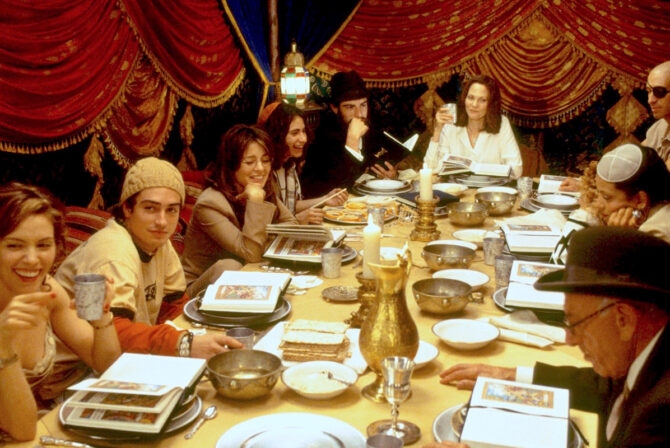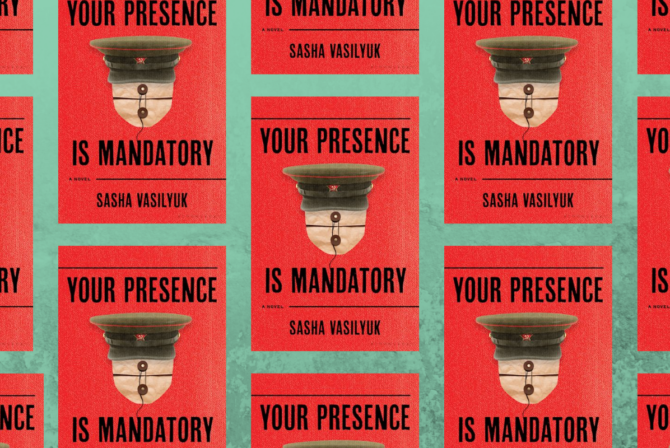Tomorrow, December 5th, NBC will air The Sound of Music – Live! Rather than a remake of the much loved Julie Andrews movie, this is actually a revival of the original Broadway production.
The Sound of Music was the first movie I saw upon immigrating to the U.S. as a child. It gave me nightmares. Not, as so many people guess, due to the overabundance of lederhosen, but due to the overabundance of Nazis. Maybe the guys in the crimson armbands didn’t mean much to American kids in the 1970s, but, coming from the USSR, I knew all about fascists and how they were out to get little children. (What I didn’t know then, was that the Nazis had been out to get Jews, specifically. Despite the existence of graveyards like Babi Yar, that detail was minimized in the Soviet Union.)
Maybe it was as a result of my (over)-reaction, that my aunt simply never showed my little cousin the final part of the movie. She turned off the videocassette after Maria and the Captain get married.
When my cousin grew up and found out how The Sound of Music really ended (it’s very possible I may have been the one who enlightened her; I was that kind of kid), it changed the entire movie for her.
Meanwhile, as I grew up (and got a degree in Media Studies), I learned numerous tidbits about the making of the film that made me see it in a different light, too.
In honor of the brand new production, I will share with you seven of these tidbits… one for each of the Von Trapp moppets.
1) In her book, Forever Liesel, Charmian Carr (the “16 Going on 17“ Von Trapp) claims that Christopher Plummer (the Captain Von Trapp) flirted with her and tried to get her drunk so he could seduce her. (Don’t worry, she was actually 21 going on 22). Plummer responds, “We didn’t do nothin’. But she was a very cute girl. I liked her enormously. And the other children were too young.”
2) You know that fun scene when the kids are on the boat, and they see their father and they’re so excited that they stand up and shout and wave and the boat tips over, to much laughter for all? Kym Karath (the littlest and thus most important Von Trapp) wasn’t laughing. She was drowning. Kym couldn’t swim, and Julie Andrews was supposed to grab her as they went under. Except that Julie fell on one side of the boat, and Kym on the other. Allan Callow, the Assistant Director’s son (he’s also the Nazi who shouts, “They’re gone!” at the end of the festival), dove in after her. Allan rescued Kym, and met her older sister, Francie (who had earlier lost the role of Liesel to Carr). Francie and Allan ended up getting married. Guess they were really grateful. (And didn’t hold that “They’re gone!” business against him.)
3) Speaking of little Kym Karath, she hated the food on location in Salzburg. As a result, all she ate was bread and artichokes (yes, in the land of strudel and cream pastries, one little girl preferred artichokes–go figure). And she got very, very heavy from them. You can watch her weight go up and down all throughout the movie, since the scenes were shot out of chronological order. See Carr struggle to carry her upstairs during “So Long, Farewell.” And when it came time to hike over the Alps, Plummer put his foot down and refused to hoist Kym onto his back. That’s a stand-in you see in the final shot.
4) Natalie Wood in West Side Story, Audrey Hepburn in My Fair Lady, Deborah Karr in The King & I, Rosalind Russell in Gypsy—all their singing voices were dubbed by Marni Nixon (oh, if only Russell Crowe had deigned to do the same for
Les Miserables
). Despite being heard in dozens of movies, Marni Nixon was seen on film only once. As one of the nuns who wants to know “How Do You Solve a Problem Like Maria?” (For soap fans, the nun who “interferes” with the Nazi’s carburetor is Anna Lee, later matriarch Lila Quartermaine on General Hospital.)
5) Despite dealing with the problems of an aristocratic Austrian in 1930s Europe (I’ve got to think while Captain Von Trapp was having a tough time of it, many others were facing greater perils–in fact, in real life, it was his sons whom the Captain didn’t want drafted, not himself), The Sound of Music was written by two Jews, Richard Rodgers (nee Rogazinsky) and Oscar Hammerstein (a descendant of German Jews, though raised Presbyterian). The last tune this team wrote was “Edelweiss“, a song of national pride so stirring that many still insist they translated an existing Austrian classic into English. Actually, the inspiration for “Edelweiss” came from the guitar-playing and folk-singing talents of the actor who first played Captain Von Trapp on Broadway–the Jewish Theodore Bikel (his Austrian-born father named him after Zionist Theodor Herzel; the family fled for Palestine prior to World War II).
6) The opening number of Andrews cavorting amongst hills alive with the sound of music was filmed partially from the air (with helicopter gusts that kept knocking Andrews down) and partially on the ground. Initially, the production team worried how they would truck their equipment up said mountains. Fortunately, they discovered an unused road. That had been built to transport prisoners to a local concentration camp. (Presumably in Landsberg, as it is closest to the town of Schellenberg, Germany where the sequence was shot.)
7) As the Von Trapps escape over the Alps into Switzerland (technically, if you look closely, they are actually heading straight into Berchtesgaden, Germany and Hitler’s Eagles’ Nest, so perhaps a quick course correction is in order), viewers are assured of a Happily Ever After. Well, for them, anyway. But, what about the nuns who helped these wanted fugitives escape? And what of Uncle Max? Dear Uncle Max. Musical promoter and BFF to the evil (though, what evil thing did she do, exactly, except voice a desire to send the children to boarding school? In that time and place, it was a pretty commonplace option, especially if the parents traveled) Baroness Schrager. It wasn’t until I was an adult that I realized two things about Uncle Max. Uncle Max was Jewish, and Uncle Max was gay. And now, on top of those two strikes against him, Uncle Max just facilitated Captain Von Trapp’s flight from Austria. Does anyone see anything positive happening to Uncle Max in the next few years? (Granted, there never was an Uncle Max, he is a total fabrication. But, since when has someone not being real ever prevented a Jewish mother from worrying? I am very worried about Uncle Max!)
Now. Go back to the very beginning (I hear it’s a very good place to start) and watch the movie again.
Yes, this is what people with Master’s in Media Analysis consider one of their “Favorite Things.” Probably why so many of us are “Lonely Goatherds.”
Auf wiedersehen!
Like this post? Get the best of Kveller delivered straight to your inbox.







